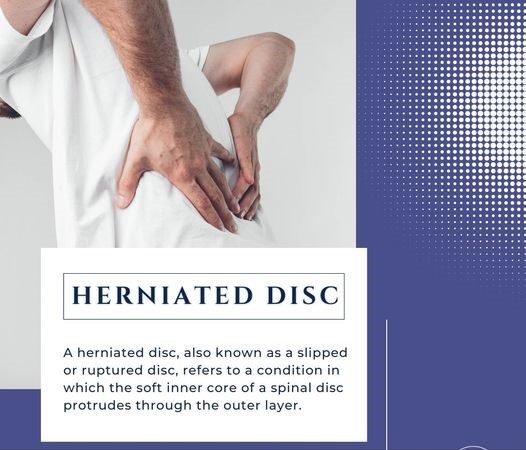A herniated disc, also known as a slipped or ruptured disc, refers to a condition in which the soft inner core of a spinal disc protrudes through the outer layer. Spinal discs are gel-like cushions that sit between the vertebrae, providing support, flexibility, and shock absorption to the spine. When a disc herniates, it can put pressure on nearby nerves, leading to various symptoms and discomfort.
The most common location for a herniated disc is in the lower back (lumbar region) or the neck (cervical region). However, it can occur in any part of the spine. Herniated discs often result from the wear and tear associated with aging, but they can also be caused by trauma, lifting heavy objects improperly, or engaging in activities that strain the spine.
Symptoms of a herniated disc can vary depending on its location and the nerves affected. Common signs include localized pain, radiating pain down the arms or legs, numbness, tingling, or muscle weakness in the affected area. These symptoms can range from mild to severe, impacting daily activities and quality of life.
A thorough evaluation by a healthcare professional, such as a doctor or spine specialist, is necessary to diagnose a herniated disc. Imaging tests like MRI or CT scans may be used to visualize the spine and confirm the diagnosis.
Treatment options for a herniated disc depend on the severity of symptoms and the individual’s condition. Non-surgical approaches like rest, pain medications, physical therapy, and lifestyle modifications are often recommended initially. In more severe cases or when conservative methods fail to provide relief, surgical intervention may be considered.
It’s important to consult with a healthcare professional for an accurate diagnosis and personalized treatment plan if you suspect a herniated disc. They can provide guidance based on your specific situation and help you manage the condition effectively.
Dr. Darakchiev is a board-certified, fellowship-trained neurosurgeon skilled in diagnosing and treating a variety of brain, spine and peripheral nerve disorders. To schedule an appointment, please call 631-690-9080.





